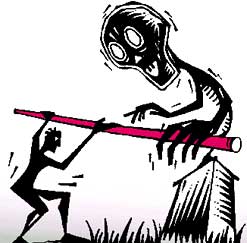Uncertain future
 "have you ever known a pesticide to kill anyone?' a neighbour asked me the other day. She is a good farmer. She uses pesticides lightly, only when she really needs them. I pick apples at her place, because on my own, where I use no pesticides, I do fine with every crop except apples. "No,' I said, "other than deliberate misuse or accidents like Bhopal, I do not think pesticides kill people, not directly, not often.' My concern has been ecological. I don't believe in poisoning all the creatures in the countryside just to eliminate one small pest, especially if I have invited that pest by planting large expanses of its favourite food.
"have you ever known a pesticide to kill anyone?' a neighbour asked me the other day. She is a good farmer. She uses pesticides lightly, only when she really needs them. I pick apples at her place, because on my own, where I use no pesticides, I do fine with every crop except apples. "No,' I said, "other than deliberate misuse or accidents like Bhopal, I do not think pesticides kill people, not directly, not often.' My concern has been ecological. I don't believe in poisoning all the creatures in the countryside just to eliminate one small pest, especially if I have invited that pest by planting large expanses of its favourite food.
Recently, however, I have read John Wargo's new book, Our Children's Toxic Legacy (Yale University Press, 1996), so now I am also worried about what pesticides may be doing to people. Wargo's book says that of the 325 pesticides that are legally allowed to remain as residues in food, one-third are suspected of causing cancer. One-third are known to disrupt the nervous system. A whole new bunch is coming under investigation for disrupting hormonal signals that guide the development of foetuses, the growth of children and the ability to reproduce.
Nearly 100 pesticides are legally allowed (in tiny quantities) in milk, which makes up 21 per cent of a toddler's diet. A child may encounter 13 different insecticides and fungicides on apples, 26 on grapes, 20 on oranges. Ten per cent of tested community water sources and four per cent of rural wells contain pesticide residues. Children are especially at risk, because they are more sensitive than adults to harmful chemicals. Wargo, a professor of environmental policy at Yale University, Connecticut, and a scienti-fic advisor to the
Related Content
- Global energy outlook 2024: peaks or plateaus?
- From climate risk to resilience: unpacking the economic impacts of climate change in Kenya
- Global energy outlook 2023: sowing the seeds of an energy transition
- Strategic investment pathways for resilient water systems
- Regional economic outlook: Sub-Saharan Africa- living on the edge
- Informal services in Asian cities: lessons for urban planning and management from the COVID-19 pandemic
